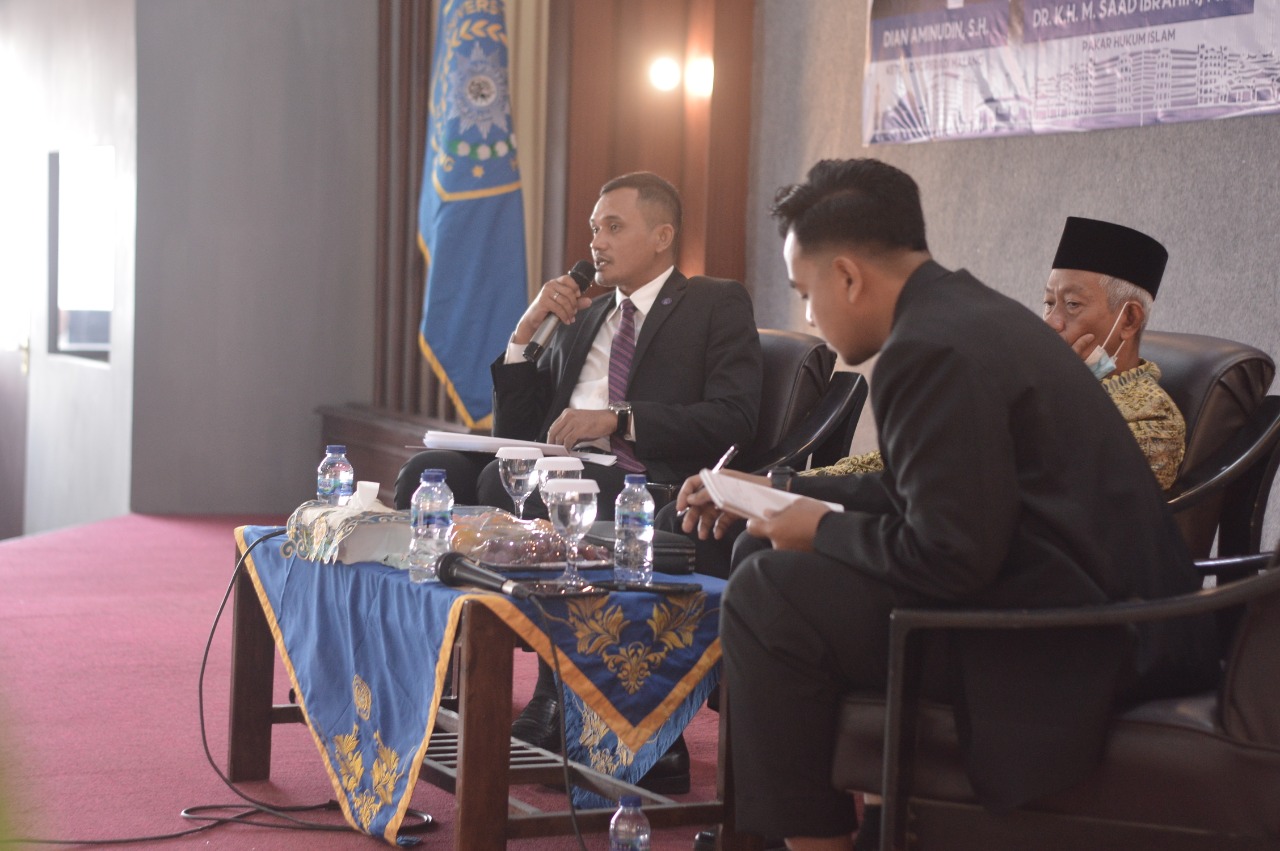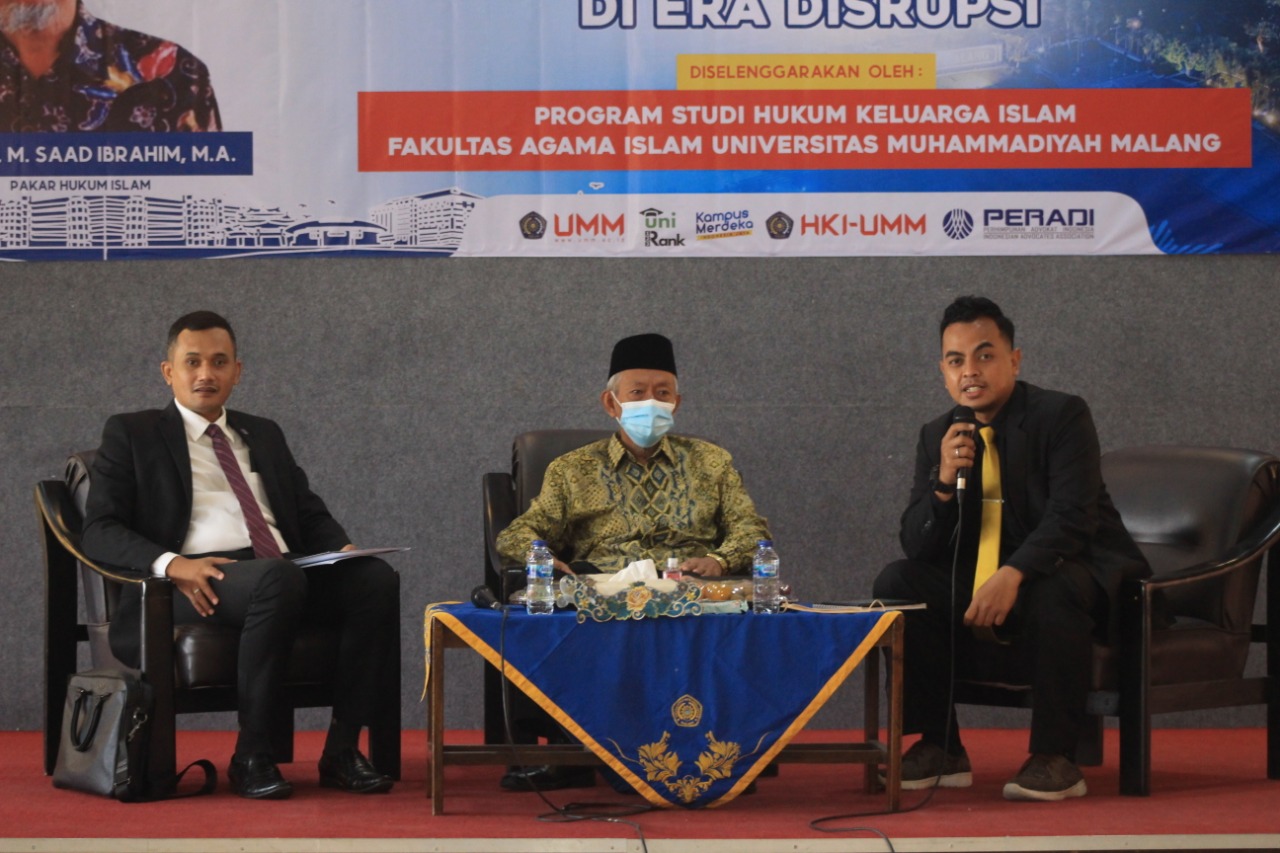On Wednesday, September 28, 2022, the Islamic Family Law (HKI) program at Universitas Muhammadiyah Malang (UMM) held its inaugural lecture alongside the launch of the Corporate Law School. The event featured prominent speakers, including Dr. K.H. Saad Ibrahim, M.A., an expert in Islamic law, and Dian Aminudin, S.H., M.H., the Chairperson of the Malang City Bar Association (Peradi). Both speakers delivered lectures to HKI students in the auditorium on the 6th floor of GKB 3, UMM.

In his lecture, Kiai Saad, as he is affectionately known, discussed the historical trajectory of legal thought in Indonesia, emphasizing its long-standing development alongside Indonesia's struggle for independence.
"From a historical perspective, the formulation and ratification of the Jakarta Charter, which later became enshrined in the Preamble to the 1945 Constitution, marked a pivotal point in the history of Islamic legal thought in Indonesia. It aimed to end the grip of the diabolical receptie theory imposed by colonial authorities through their deceptive politics," he explained.
He elaborated that the formal repeal of the receptie theory occurred with the ratification of the 1945 Constitution. However, its influence persisted well into Indonesia's independence era and was evident even during the enactment of Law No. 7 of 1989 on Religious Courts. Traces of the receptie theory remained deeply entrenched in the mindset of some Indonesian Muslims.
This legacy is evident in the debates surrounding amendments to Law No. 1 of 1974 on Marriage and Law No. 7 of 1989 on Religious Courts. Advocates of the receptie theory often opposed or sought to minimize the codification of Islamic law into Indonesia’s formal legal framework. However, thanks to the efforts of Islamic thinkers in Indonesia, continuous reform of Islamic law has been achieved, noted the scholar, who also serves as a leader in Muhammadiyah.

In the subsequent session, Dian Aminudin discussed the practical implementation of Islamic law in Indonesia, focusing on the high divorce rates in Malang Regency. In 2021, there were 6,429 divorce cases recorded. The Religious Courts, as part of the judiciary, play a significant role in ensuring civil rights and legal protection for the public within their jurisdiction.
Dian noted that progressive legal studies emerged from concerns over the state of law in Indonesia, which has not yet reached an ideal condition of providing welfare and happiness to its people.
This concept, pioneered by Satjipto Rahardjo, seeks to address the shortcomings of the legal system by proposing meaningful changes, rapid transformation, fundamental reversals, liberation, and breakthroughs. This approach places humanity at the center of legal discussions and enforcement, promoting the idea that "law is for humans, not humans for the law."
The progressive law concept aligns with the principles of legal protection found in maqashid shariah (the objectives of Islamic law). The law is not only aimed at protecting religion but also at ensuring the protection of life, intellect, lineage, and property.

This approach begins by positioning humanity and human values as the central focus—or primus—in the discussion and enforcement of law. Consequently, the relationship between law and humanity is characterized by the principle: "law exists for humans, not humans for the law."
The concept of progressive law aligns closely with the principles of legal protection as outlined in maqashid shariah (the objectives of Islamic law). The purpose of law extends beyond safeguarding religion; it must also guarantee the protection of life, intellect, lineage, and property.
The maqashid shariah concept, which emerged centuries ago among Muslim intellectuals (ulama), embodies a breakthrough against intellectual stagnation by fostering a spirit of reinterpretation of sacred texts (nash). However, the emergence of this spirit of ijtihad (independent reasoning) must remain within the boundaries of the overarching objectives of Islamic law, he concluded. (ik)